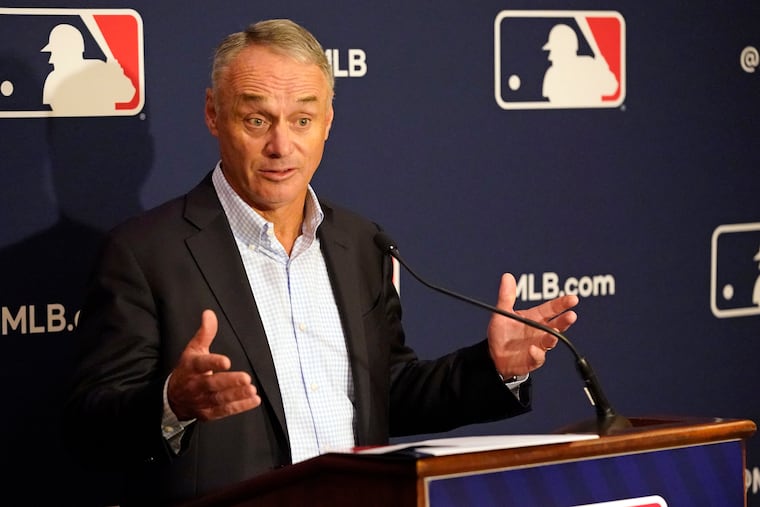MLB rejects players’ latest proposal, all but guaranteeing the season won’t start on time
With Monday’s deadline fast approaching, Saturday’s talks between MLB and its players did little to stir an optimism that a deal is near.

Never mind whether Major League Baseball and the Players Association will come together on a collective bargaining agreement in time to avoid the cancellation of regular-season games.
For a few hours Saturday night, it seemed talks may break off entirely.
Faced with MLB’s Monday deadline — many players view it more as a pressure tactic — to reach a deal or see the schedule clipped from 162 games and full-season pay withheld, the union on Saturday made a revised, multipoint offer that covered arbitration eligibility, revenue sharing, and the competitive-balance (luxury) tax, among other issues, according to sources familiar with the meeting.
The owners didn’t respond favorably, sources confirmed, claiming the union didn’t move enough on most core economic issues and restating their position that any attempt to make more two-year players eligible for salary arbitration is a nonstarter. In turn, the players were said to be furious and discussing whether to come back to the bargaining table Sunday. They decided to return for what will be a seventh consecutive day of talks at a spring-training ballpark in Jupiter, Fla.
» READ MORE: The Phillies' Ranger Suárez as the face of the MLB labor fight
But any chance, however remote, of coming to an agreement by Monday — or even building momentum toward a deal — appears to be all but scuttled. Opening day, scheduled for March 31, almost certainly will be pushed back, and with emotions on both sides ratcheting up, it’s possible that the labor dispute will grow increasingly ugly this week.
Since talks resumed last month — after a 42-day hiatus from the owners’ Dec. 2 enforcement of a lockout — the players’ proposals have been mostly narrow in scope, tackling two or sometimes only one issue at a time. But the players see many of the core economic issues as interconnected. And after a lengthy Zoom meeting that included all 30 player representatives, they changed their approach and made a wider-ranging proposal.
For the first time since the lockout began, the players adjusted their stance on the competitive-balance tax, lowering their proposed tax thresholds by $2 million in 2023 ($250 million), 2024 ($257 million), and 2025 ($264 million). The owners responded by bumping their 2023 threshold from $214 million to $215 million and lowering their proposed hike in the tax rates from 50% to 45%, still more punitive than the 20% rate in the expired CBA. As long as the tax rates go up, the players claim the CBT acts as a de facto salary cap.
But while the owners barely moved on the CBT, they refused to budge at all on making more than 22% of two-year players eligible for salary arbitration, a level that has not moved since 2013, even though the players on Saturday brought down their request from 75% of two-year players to 35%.
The players also gave up a request to cut revenue sharing by $30 million per year but preserved another aspect of their proposal by incentivizing small-market teams to spend. Like salary arbitration, the owners view any changes to revenue sharing as a third rail not to be touched.
» READ MORE: Minor-league players on 40-man rosters are the untold stories of MLB’s lockout
Entering the weekend, the sides were closing in on an agreement on the parameters of a draft lottery to help combat tanking. But even that fizzled Saturday when the owners tried to make that issue contingent upon the players’ agreeing to expanded playoffs. Regardless, sources on both sides regarded a draft lottery as secondary to the core economic issues over which they are far apart.
Sunday marks the 88th day since the owners locked out the players, initiating MLB’s first work stoppage in a quarter-century. Pitchers and catchers were scheduled to reported to Florida and Arizona nearly two weeks ago. Spring-training games would have begun Saturday. Instead, they’ve been canceled through March 7.
MLB commissioner Rob Manfred said recently that any disruption to the 162-game season would be a “disastrous outcome” for baseball. But he also said the league believes players will need four weeks to adequately prepare for the season. With opening day now 33 days away, MLB set Monday as a deadline to come to an agreement or begin canceling games.
Over the last few days, both sides have made threats.
An MLB spokesman said last week that players won’t be paid for 162 games if the season is shortened. The players responded by indicating they plan to deny the owners’ bid for expanded playoffs — the one significant change that the owners and the league are seeking in a new agreement — if games are canceled. The players also would counter by rejecting the owners’ desire to put commercial patches on uniforms.
» READ MORE: Phillies’ Alec Bohm, and players like him, have already lost plenty because of MLB lockout